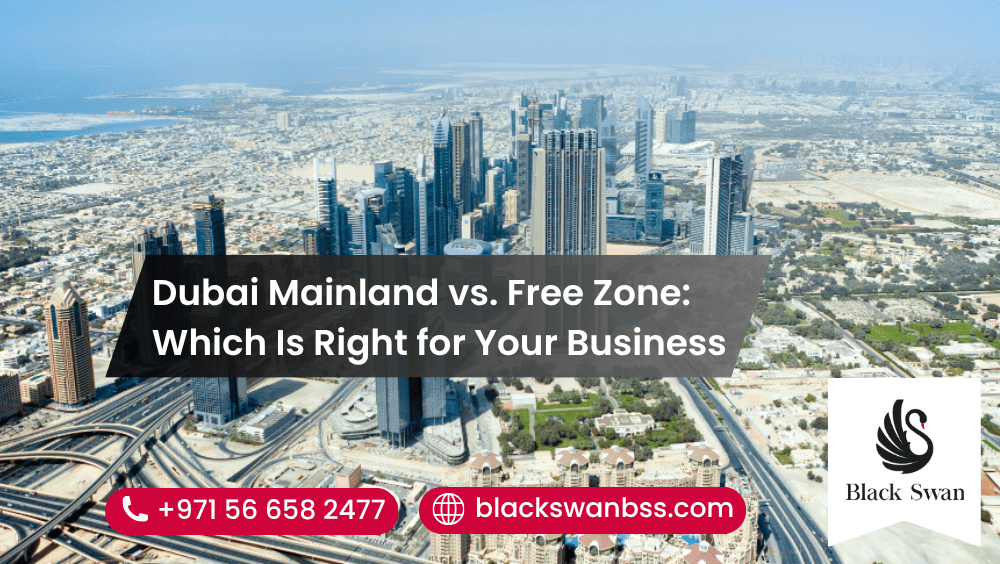Office Time
Mon-Sat: 8am to 8pm


Thinking about business setup in Dubai? Excellent choice. Yet one big decision stands between you and launch day: Dubai Mainland or Free Zone. Each path offers real advantages. Anyhow, the “best” route depends on your growth plans,ownership,licensing needs, expectations, and market. Thus, let’s compare them clearly—without jargon—so you can move forward with confidence.
Table of Contents
Apparently, Dubai Mainland companies are licensed by the Dubai Department of Economy & Tourism (DET) and can operate internationally and across the UAE market. Simultaneously, Free Zone companies are licensed by specific authorities (like Shams Free Zone in Sharjah DAFZA, JAFZA, IFZA, or DMCC, ). In addition, they’re designed to simplify service activities,tech, and cross-border trade, with modern infrastructure and fast onboarding. Get details on Business Setup in Dubai.
Historically, investors leaned toward Free Zone structures for 100% foreign ownership. Today, many Mainland activities also permit full foreign ownership. Still, not every activity qualifies. Therefore, if you want guaranteed 100% ownership for your specific license category, Free Zone remains the most predictable choice. In contrast, if your Mainland activity allows it, you can enjoy full control while trading anywhere in the UAE.
If your revenue relies on local consumers or frequent on-site services, Mainland likely fits better. Otherwise, if your focus is export, e-commerce, consulting, or tech, Free Zone may be ideal.
Both platforms offer wide activity lists. However, Mainland lists are broader for on-shore operations (e.g., restaurants, clinics, retail). Free Zones often specialize—DMCC for commodities, DIFC/ADGM (outside Dubai, but relevant regionally) for finance, and IFZA or Shams for startups and creative businesses.
Therefore, start with your activity first. Then choose the jurisdiction that supports it cleanly. Consequently, this activity-first approach amendments,money, and saves time, later.
Because rent is a recurring cost, factor in space requirements early. If you want lean overhead at the start, Free Zone flexi-desk packages are very appealing.
Banks in the UAE care about economic substance, real operations, and clear source of funds. Whether Mainland or Free Zone, prepare robust documentation, lease evidence, and a clear business plan. Free Zones with strong reputations (e.g., DMCC, JAFZA) may smooth the process; Mainland firms with visible on-shore activity also signal solidity. Therefore, pick a structure that reflects genuine activity, not just the cheapest route.
Apparently, the UAE remains business-friendly. Moreover, you still need to manage VAT registration when thresholds apply, proper bookkeeping, and—where relevant—corporate tax obligations. Additionally, free Zone entities may benefit from specific Free Zone corporate tax regimes if they meet qualifying criteria; anyhow, details depend on activity, income sources, and compliance with Qualifying Free Zone Person conditions.Mainland firms follow the standard rules across the UAE market. Looking for a Corporate Tax Consultants in Dubai?
Free Zones are famous for speed: digital onboarding, bundled packages, and predictable fees. You can often secure a trade license quickly, especially for service activities. Mainland can be just as fast for straightforward cases; yet approvals may involve more steps if your activity touches regulated sectors.
Cost-wise, Free Zones advertise transparent bundles (–visas+flexi-desk +license –).Additionally, Mainland offers flexibility to shop office deals citywide. Because of which , compare the all-in first-year cost and the ongoing renewal cost, including rent.
Brand perception matters. Some Free Zones double as vibrant ecosystems—coworking spaces, accelerators, startup programs, and networking. If your business thrives on partnerships, a quality Free Zone community can be priceless. Conversely, Mainland addresses help retail credibility and local procurement. Moreover, Mainland location choices (Downtown, Business Bay, Al Quoz, Deira, etc.) allow you to position near suppliers or customers. Get details on Business Establishment in Dubai.
To begin with ,you can start in a Free Zone for cost and speed control, after that open a Mainland branch later for local trade. Alternatively, if you know you’ll sell on-shore from day one, start Mainland and expand with additional branches or Free Zone entities for warehousing, logistics, or exports. Because Dubai supports multi-entity groups, you don’t have to box yourself into one path forever.
Use this “gut-check” shortlist to choose quickly:
Choose Dubai Mainland if you:
Choose a Free Zone if you:
Therefore, follow these steps, and you’ll pick a structure that supports growth—without costly changes later.
Related Articles:
» Procedure to Setup a Business in Dubai Free Zone
» Advantages of Setting up a Company in Dubai Free Zone
» Differences between Dubai Mainland and Dubai Free Zone Business Set Up
» How to Register a Company in Dubai Mainland with Full-Foreign Ownership?
» Mainland vs. Free Zone Company Formation in Dubai
Choose Dubai Mainland if you need government contracting, brick-and-mortar presence, or immediate UAE market access. Otherwise,choose a Free Zone if you want speed, 100% foreign ownership certainty for your activity, and cost-effective scaling—especially for international services or e-commerce. In either event, align your banking, tax position, visas, space, and license, with your growth plan. After that, set your timeline and launch. Because in Dubai, momentum pays.
Free Zones usually offer the fastest onboarding, especially for service activities and flexi-desk packages.
Yes, usually using a Mainland branch or a local distributor; extra steps are required for direct on-shore trading.
Many Mainland activities allow it now; Free Zones typically guarantee 100% for qualifying activities.
Usually, Mainland, because you can trade directly across the UAE without intermediaries.
Usually, Free Zones, due to flexi-desk options and bundled packages.
Both can work; strong substance, clear activity, and reputable jurisdiction help most.
Yes. Mainland and Free Zone visas link to your leased space or flexi-desk package.
Rules apply by activity and income sources. Plan with an adviser for optimal compliance.
You can open additional entities or branches to expand Free Zone or Mainland reach.
Normally, Free Zone, because of lean overhead,export focus, and fast setup.